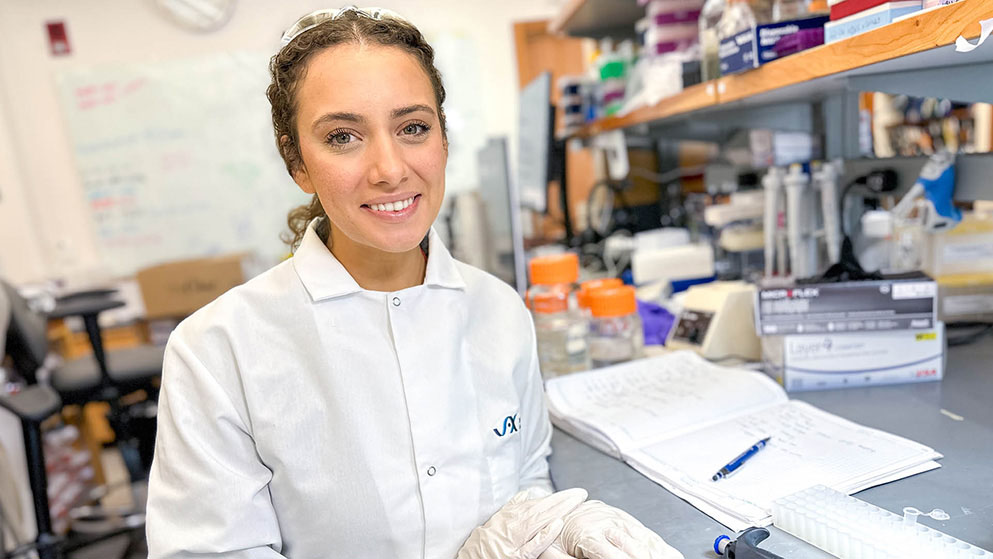 Rei Bufi, JAX postbaccalaureate associate
Rei Bufi, JAX postbaccalaureate associate
A 5-question chat with an up-and-coming JAX researcher.
Rei Bufi is a postbaccalaureate associate in the Bar Harbor, ME laboratory of Ron Korstanje, Ph.D., a position supported through philanthropic gifts to JAX. Before she moves on to her M.D./Ph.D. program at the University of Connecticut, we asked her to share what she has gained through her JAX training thanks in part to the donors who supported her journey.
1. What drew you to JAX and its postbaccalaureate program?
During my senior year of undergraduate work at UConn, I debated between going to medical school or pursuing my Ph.D. My parents moved to the United States from Albania when I was 16 to give me and my sister better educational opportunities, so I didn’t know much about the types of programs available. I wasn’t sure what to do next when a friend sent me a flyer for the JAX postbaccalaureate program. I was familiar with JAX through UConn and knew it had a reputation for great research.
2. What type of research have you undertaken in the Korstanje Lab?
I’ve been investigating the relationship between kidney disease and diabetes. In some cases, diabetes can generate complications in kidney function that can lead to death. My research explores ways to manage diabetes to keep it from progressing to kidney disease. I’ve been looking at the genetic markers that might predispose someone to end-stage diabetes and kidney disease. My ultimate goal is to translate my findings into a treatment that helps people manage the disease.
3. Thinking about your time at JAX over the past two years, what are you most proud of and what will you stick with you?
I’m most proud of how much I’ve grown in my way of thinking — and not just in my research. I have a new instinct for critical thinking in general, whether I’m listening to the news, approaching new technology or questioning a supposed truth. My time at JAX has shown me to not take one simple thing and just run with it. I always question and hone in on what’s important.
I will remember our fun and collaborative laboratory environment. Ron is a great mentor, and I have become close with my lab team. I come from a culture where there is definite hierarchy and distance between a superior and a subordinate. So I came in thinking I might be perceived as someone at the ‘bottom of the barrel,’ but that was not the case at all. Everyone in the lab is encouraged to make contributions regardless of degree or experience.
4. Let’s fast forward 10 years. What major human health challenge are you investigating, and how do you feel you’ve made a difference?
I like to imagine I will have finished both of my doctoral degrees and will be living on the East Coast, maybe Boston or New York. I’m not sure what my medical specialty will be, but I do have a passion for human rights in healthcare, particularly around immigrant and refugee health accessibility. I hope to contribute to better healthcare for immigrants in the United States. If I can improve life for even one patient, it will mean a lot.
5. What would you say to the donors who helped support your time at JAX?
I feel very grateful and lucky for the opportunity to participate in this program. I love knowing that there are real human beings like you who helped make this possible. This program empowers young scientists to take their career to the next level, and it has opened so many doors for me. At the same time, the impact of the program is bigger than just me. My work has contributed to several aspects of kidney disease research with real-life implications that could make such a difference for the future of human health. By helping one person, your generosity supports new research that could have broad implications for humanity. You are making a real difference in students’ lives, and yet it’s just the beginning of what’s to come.